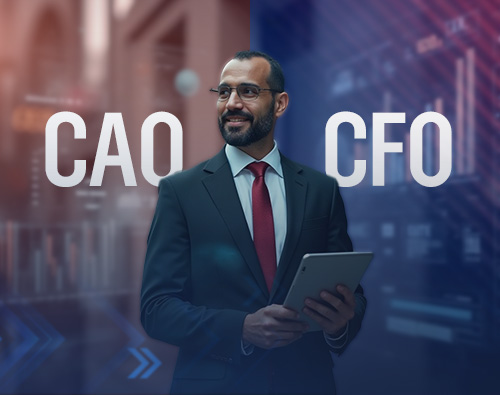Qualifications and Career Path of a Chief Financial Officer
Qualifications and Career Path of a Chief Financial Officer

Accounting
Qualifications and Career Path of a Chief Financial Officer
The position of Chief Financial Officer (CFO) is one of the most important roles in organizations and companies, as it is considered the cornerstone of business sustainability in both local and global markets. In this article, we will discuss everything related to the CFO’s career path, along with the most important certifications required to reach this influential position in the corporate world.
Qualifications and Career Path of a CFO
When talking about the qualifications and career path of a CFO, it is important to highlight that this role requires a combination of academic degrees and practical experience. The CFO position is not reached overnight but rather through gradual career development.
Experts note that the path to becoming a CFO typically begins with Best Courses and Certifications to Become a Financial Manager, which may include one or more of the following fields:
-
Accounting: Helps in understanding financial reports, market analyses, and calculations.
-
Business Administration: Provides a broad understanding of corporate operations, strategies, and effective solutions.
-
Finance: Focuses on financial planning, risk management, and forecasting market trends.
-
Economics: Offers insight into macroeconomic conditions, market fluctuations, and overall trends.
After obtaining an academic degree, many professionals pursue higher education such as a Master of Business Administration (MBA) or a Master of Science in Finance (MSF). Additionally, professional certifications like Certified Public Accountant (CPA) or Chartered Financial Analyst (CFA) are highly valued by companies worldwide, as they boost credibility and accelerate career progression.
Key Steps to Becoming a CFO
While education plays a crucial role, practical experience is equally essential. The typical career path toward a CFO role includes:
-
Starting as an Accountant – responsible for preparing reports and data analysis.
-
Becoming a Financial Analyst – conducting evaluations to build company forecasts.
-
Advancing to Financial Controller – overseeing company finances and ensuring compliance.
-
Reaching CFO level – requiring years of practice, decision-making skills, and leadership.
In addition to these stages, the role demands specific professional skills to build a comprehensive expertise that qualifies one for the CFO position.
Essential Skills for a CFO
-
Financial Expertise: Strong grasp of accounting, taxation, budgeting, and forecasting.
-
Competence: Ability to translate financial data into actionable strategies, coordinate departments, and manage crises effectively.
-
Strategic Planning: Developing long-term financial strategies by analyzing market conditions and trends.
-
Risk Management: Navigating crises with minimal losses while safeguarding the company’s future.
-
Leadership and Communication: Acting as a link between departments, negotiating, and leading teams toward achieving company goals.
How Long Does It Take to Become a CFO?
The timeline to reach a CFO position is not fixed; it depends on factors like industry type, company size, and personal career development. On average, experts estimate it takes 9 to 20 years of combined education, experience, and professional certifications to reach this role.
Success Stories of CFOs
The corporate world is full of inspiring CFO success stories. For example, Michelle Hickox, a Certified Public Accountant in Texas, became a CFO in 2004. Unlike many who sacrificed personal life for work, Michelle balanced her family responsibilities with professional growth.
By obtaining advanced certifications, demonstrating competence, and proving her leadership in times of financial crises, she earned the CFO position at Independent Bank in McKinney, Texas. Her story highlights that success as a CFO comes from expertise, adaptability, and strong leadership not just long working hours.
Becoming a CFO requires a combination of education, professional certifications, and extensive practical experience. It is a journey of continuous learning, strategic decision-making, and leadership. Those who balance these elements effectively can achieve this influential role and drive companies toward lasting success and sustainability.
Related Articles
Explore Articles on Finance, Accounting, and Career Growth


